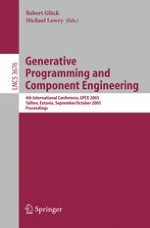2005 | Buch
Generative Programming and Component Engineering
4th International Conference, GPCE 2005, Tallinn, Estonia, September 29 - October 1, 2005. Proceedings
herausgegeben von: Robert Glück, Michael Lowry
Verlag: Springer Berlin Heidelberg
Buchreihe : Lecture Notes in Computer Science
